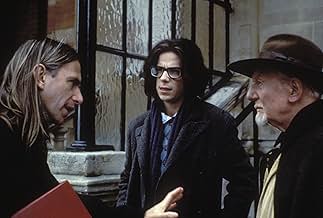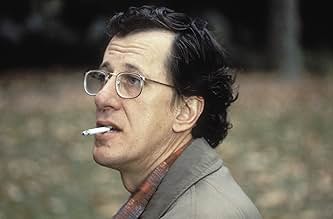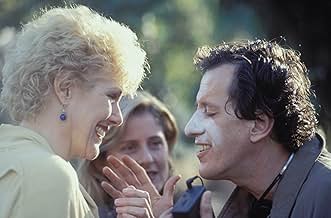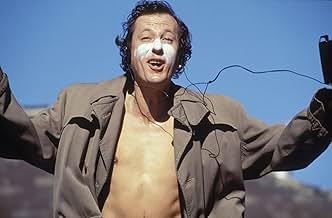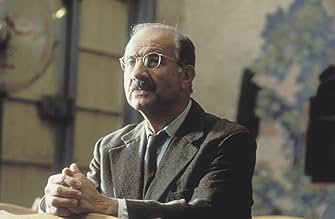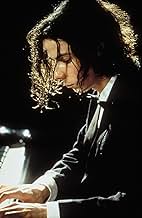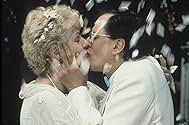David Helfgott, a gifted pianist, struggles through childhood adolescence as his strict father abuses him and his siblings. Years later, he suffers a mental breakdown but manages to return a... Read allDavid Helfgott, a gifted pianist, struggles through childhood adolescence as his strict father abuses him and his siblings. Years later, he suffers a mental breakdown but manages to return as a legend.David Helfgott, a gifted pianist, struggles through childhood adolescence as his strict father abuses him and his siblings. Years later, he suffers a mental breakdown but manages to return as a legend.
- Won 1 Oscar
- 46 wins & 53 nominations total
- Director
- Writers
- All cast & crew
- Production, box office & more at IMDbPro
7.658.4K
1
2
3
4
5
6
7
8
9
10
Featured reviews
Plausible harmony
Okay, so I did some reading after this driven by idle curiosity about the account. The real Helfgott didn't spend 15 years abandoned in a room with a piano, he didn't have to stand in the rain outside of a bar before they would let him in. He was pretty well known in the local scene as a pianist, his father was not a Holocaust survivor and David had been married before. Father and son were never really estranged and David was present at his funeral.
But just the same, the 'objective' point-of-view that purports to explain him, or any of us at any time based on a few facts, is in the end no less hypocritical than any attempt to pass dramatization as 'the real story'. This matters. Someone can be present at a funeral without being truly present, and someone can feel forgotten and alone even when they're factually surrounded by people, estranged from a parent even when formally this was never so.
The film is at a simple emotional level where the attempt to conquer a maddening complexity (music, life) snaps the tethers of mind and in due time the reconfiguring of this damage into blossoming art. The moral is that we must keep trying and hope for the best, perhaps the worthiest lesson even if it appears slightly trite in the context of a more or less happy ending.
Still, why feel the need to invent all those things, knowing you are doing so? When the violence inflicted on the son could be inferred by a more ambiguous tension instead of an outright beating.
Because, it seems, we can only choose to accept the lesson if at the center we find a good soul worthy of the saving. In other words, it is not the fact that he gives a great last recital that matters, but that he plays at all; not that a genius was salvaged because he might never have been that, but a human being. And this is what rankles so much Helfgott's critics who find him borderline incompetent in his playing - he is cheered on in concerts because he is the character from this film.
Ideally we would be able to discern all these points here instead of one harmony: the truly damaged but kind soul, the inability to place blame for that damage on any ogre father or Holocaust, and being able to somehow experience his music (the real Helfgott recorded for the film) as a trained ear would, fixated flourishes followed by distraction and incompetence according to critics, musically extending the damaged self.
For a more demanding film on the same subject of madness and transcendent musical genius see a little known film on a medieval composer called Death in Five Voices: all about the dissonance between different voices trying to harmonize a story and this carried in the music itself.
But just the same, the 'objective' point-of-view that purports to explain him, or any of us at any time based on a few facts, is in the end no less hypocritical than any attempt to pass dramatization as 'the real story'. This matters. Someone can be present at a funeral without being truly present, and someone can feel forgotten and alone even when they're factually surrounded by people, estranged from a parent even when formally this was never so.
The film is at a simple emotional level where the attempt to conquer a maddening complexity (music, life) snaps the tethers of mind and in due time the reconfiguring of this damage into blossoming art. The moral is that we must keep trying and hope for the best, perhaps the worthiest lesson even if it appears slightly trite in the context of a more or less happy ending.
Still, why feel the need to invent all those things, knowing you are doing so? When the violence inflicted on the son could be inferred by a more ambiguous tension instead of an outright beating.
Because, it seems, we can only choose to accept the lesson if at the center we find a good soul worthy of the saving. In other words, it is not the fact that he gives a great last recital that matters, but that he plays at all; not that a genius was salvaged because he might never have been that, but a human being. And this is what rankles so much Helfgott's critics who find him borderline incompetent in his playing - he is cheered on in concerts because he is the character from this film.
Ideally we would be able to discern all these points here instead of one harmony: the truly damaged but kind soul, the inability to place blame for that damage on any ogre father or Holocaust, and being able to somehow experience his music (the real Helfgott recorded for the film) as a trained ear would, fixated flourishes followed by distraction and incompetence according to critics, musically extending the damaged self.
For a more demanding film on the same subject of madness and transcendent musical genius see a little known film on a medieval composer called Death in Five Voices: all about the dissonance between different voices trying to harmonize a story and this carried in the music itself.
Powerful film
"Shine" purports to tell the story of David Helfgott (Geoffrey Rush, who plays the adult Helfgott), a promising pianist who overcame mental illness, with the help of his wife, and returned to performing.
The 1996 film is actually a fictionalized version of Helfgott's life - but even had it not been based on a true story, it remains a powerful, intriguing film.
David is the child of German émigrés who now live in Australia. His father Peter (Armin Mueller-Stahl) is a self-taught pianist who teaches David his same love of piano and classical music. There is love there, but as portrayed in the movie, Peter is a rigid man who gives his son mixed signals. He drives his son to succeed as a pianist, teaching him that winning is everything, and yet, when David has opportunities that would take him away from the family, Peter won't permit it. The reason for this is that Peter and his wife lost relatives in the Holocaust. Peter is also given to physical abuse toward David when he loses his temper.
David finally gets away from him and attends the Royal Conservatory in London, where, with the help of his teacher (John Gielgud), he wins an important competition but then suffers a severe nervous breakdown. The rest of the movie deals with the road back, which leads him home to Australia and to his wife, Gillian. Gillian is actually his second wife, though the first marriage isn't mentioned in the film.
The dominant performances belong to Rush and Mueller-Stahl. Rush does a brilliant job of showing us the likable but stuttering David who speaks rapidly and repetitively, expressing himself through music. Mueller-Stahl as the tortured Peter is fabulous, a man who is both monstrous and pitiable. In a small role, John Gielgud of course makes a fine impression as an elderly teacher, a wonderful pianist himself, who believes in David's talent.
The best scene is David playing Rachmaninoff's Piano Concerto #3 - Helfgott's own recording of the piece is used - and the aftermath. What I missed in this film is music - there was a lot of talk about David's promise, but until the Rachmaninoff not much playing.
Helfgott's work today has been deeply criticized for being - well, lousy. A review in The New York Times of one of his concerts is horrible. The reviewer, however, mentions that Helfgott occasionally showed vestiges of excellent technique. I think it's safe to assume that his playing nowadays is more erratic than it was in his earlier years. There are several examples of Helfgott's playing in the movie: "La Campanella," "Hungarian Rhapsody No 2 In C Sharp Minor," "Flight of the Bumble Bee," Rachmaninoff's "Prelude In C Sharp Minor, Opus 3, No. 2," the previously mentioned Rachmaninoff 3, and Liszt's "Sospiro," and it is all quite stunning. Rush does the fingerings himself. One of the comments also claims that Helfgott's wife has Helfgott perform on no medication so that he'll seem crazy - it's common for performers on medication for mental problems to have to cycle off of it before performing. I don't think the commenter has any idea what Helfgot is like on his medication - certainly in the film, he acts strangely.
"Shine" is highly recommended for its fantastic performances, beautiful music, and its inspiring story.
The 1996 film is actually a fictionalized version of Helfgott's life - but even had it not been based on a true story, it remains a powerful, intriguing film.
David is the child of German émigrés who now live in Australia. His father Peter (Armin Mueller-Stahl) is a self-taught pianist who teaches David his same love of piano and classical music. There is love there, but as portrayed in the movie, Peter is a rigid man who gives his son mixed signals. He drives his son to succeed as a pianist, teaching him that winning is everything, and yet, when David has opportunities that would take him away from the family, Peter won't permit it. The reason for this is that Peter and his wife lost relatives in the Holocaust. Peter is also given to physical abuse toward David when he loses his temper.
David finally gets away from him and attends the Royal Conservatory in London, where, with the help of his teacher (John Gielgud), he wins an important competition but then suffers a severe nervous breakdown. The rest of the movie deals with the road back, which leads him home to Australia and to his wife, Gillian. Gillian is actually his second wife, though the first marriage isn't mentioned in the film.
The dominant performances belong to Rush and Mueller-Stahl. Rush does a brilliant job of showing us the likable but stuttering David who speaks rapidly and repetitively, expressing himself through music. Mueller-Stahl as the tortured Peter is fabulous, a man who is both monstrous and pitiable. In a small role, John Gielgud of course makes a fine impression as an elderly teacher, a wonderful pianist himself, who believes in David's talent.
The best scene is David playing Rachmaninoff's Piano Concerto #3 - Helfgott's own recording of the piece is used - and the aftermath. What I missed in this film is music - there was a lot of talk about David's promise, but until the Rachmaninoff not much playing.
Helfgott's work today has been deeply criticized for being - well, lousy. A review in The New York Times of one of his concerts is horrible. The reviewer, however, mentions that Helfgott occasionally showed vestiges of excellent technique. I think it's safe to assume that his playing nowadays is more erratic than it was in his earlier years. There are several examples of Helfgott's playing in the movie: "La Campanella," "Hungarian Rhapsody No 2 In C Sharp Minor," "Flight of the Bumble Bee," Rachmaninoff's "Prelude In C Sharp Minor, Opus 3, No. 2," the previously mentioned Rachmaninoff 3, and Liszt's "Sospiro," and it is all quite stunning. Rush does the fingerings himself. One of the comments also claims that Helfgott's wife has Helfgott perform on no medication so that he'll seem crazy - it's common for performers on medication for mental problems to have to cycle off of it before performing. I don't think the commenter has any idea what Helfgot is like on his medication - certainly in the film, he acts strangely.
"Shine" is highly recommended for its fantastic performances, beautiful music, and its inspiring story.
Wonderful little story that is interesting for the majority but heartbreaking at times
David is a stuttering, rambling man having suffer a complete breakdown as a young man. However when he was a child his skills on the piano were unmatched. Driven by his father, opportunities open up in front of him to go abroad to learn, but his father denies him the chance. He leaves for London where he drives himself to the point of exhaustion before coming back home to find his father has disowned him.
It took me years to finally watch this film. I was still in Northern Ireland when it came out in the cinema and such films were not permitted to cross our borders, lest they keep the latest action movies from our 1 or 2 screen cinemas! So away from the hype and the Oscar hoopla I sat to watch this film and found myself easily taken in by it. The story is the true story of David Helfgott who was a boy genius before his breakdown. The film starts with him as an adult then jumps back to see him as a child. This approach works well to allow us to see the `end result' as it were, before we see what would be considered the causation factors. These factors are a little heart breaking to watch but they are very well delivered. As an adult, David is comic, warming and tragic. The pain in his life is brought out very well.
A great deal of the praise for this must lie with the wonderful cast. Rush got his Oscar of course and I'll leave it to the users on the message boards to argue over whether or not you can be the lead actor with screen time of less than half the film! He is great, walking a difficult line with a `disabled' character but managing not to just make it a caricature at any point. David as a child is very well played by Rafalowicz and does more of the development work than Rush and hence gets less credit than he deserves for making us care for the adult David. Mueller-Stahl is as good as he can be and gives a great performance, the only downside being that he doesn't age a single day between the adult and child sections of the story - surely some makeup could have been used?
Overall this is a very enjoyable human story that is driven by several really strong performances in key roles. The story keeps it's tone light but yet still manages to be dramatic and, in some scenes far too touching to avoid being slightly moved. The music is beautiful when it is called on to be and dramatic at other times - the director does very well to make the intense music translate into intense scenes in the film. Overall a simple story of a man but one that is interesting and a lot more moving that I expected it to be.
It took me years to finally watch this film. I was still in Northern Ireland when it came out in the cinema and such films were not permitted to cross our borders, lest they keep the latest action movies from our 1 or 2 screen cinemas! So away from the hype and the Oscar hoopla I sat to watch this film and found myself easily taken in by it. The story is the true story of David Helfgott who was a boy genius before his breakdown. The film starts with him as an adult then jumps back to see him as a child. This approach works well to allow us to see the `end result' as it were, before we see what would be considered the causation factors. These factors are a little heart breaking to watch but they are very well delivered. As an adult, David is comic, warming and tragic. The pain in his life is brought out very well.
A great deal of the praise for this must lie with the wonderful cast. Rush got his Oscar of course and I'll leave it to the users on the message boards to argue over whether or not you can be the lead actor with screen time of less than half the film! He is great, walking a difficult line with a `disabled' character but managing not to just make it a caricature at any point. David as a child is very well played by Rafalowicz and does more of the development work than Rush and hence gets less credit than he deserves for making us care for the adult David. Mueller-Stahl is as good as he can be and gives a great performance, the only downside being that he doesn't age a single day between the adult and child sections of the story - surely some makeup could have been used?
Overall this is a very enjoyable human story that is driven by several really strong performances in key roles. The story keeps it's tone light but yet still manages to be dramatic and, in some scenes far too touching to avoid being slightly moved. The music is beautiful when it is called on to be and dramatic at other times - the director does very well to make the intense music translate into intense scenes in the film. Overall a simple story of a man but one that is interesting and a lot more moving that I expected it to be.
excellent film, good in all departments, seriously moving
This is a good film in every sense but will mean most to fathers with strong views :).
The story of a brilliant young pianist whose relationship with his father drives him to some sort of mental illness. Watchable, absorbing, brilliantly edited, deeply seriously moving, one of the rare films that pays attention to incidental sound. Wonderful direction and acting. This is a seriously good film.
The story of a brilliant young pianist whose relationship with his father drives him to some sort of mental illness. Watchable, absorbing, brilliantly edited, deeply seriously moving, one of the rare films that pays attention to incidental sound. Wonderful direction and acting. This is a seriously good film.
What a difference a 2nd viewing makes
I don't now why but when I first viewed this a few years back I did not care for it, but after watching it again I was very impressed. Maybe because I have grown more of an appreciation for classical music in that timeframe. I really don't understand how I could have missed the outstanding portrayal of the nuturing/stultifying father-son relationship, or the moving way that David can only express himself via the piano (notice how he speaks in virtually only apothems). This is a very great film.
Did you know
- TriviaGeoffrey Rush had once learned the piano up until aged fourteen. He took up piano lessons again thirty years later for this movie and also acted as his own hand double and body double.
- GoofsThe character shows all signs of schizophrenia; not bipolar disorder (formerly known as "manic-depressive disorder"), as is claimed in the film. The real David Helfgott likewise displays many symptoms of schizophrenia and none of bipolar disorder.
- Quotes
Cecil Parkes: You must play as if there's no tomorrow.
- Crazy creditsHimself: hand double for Geoffrey Rush
- SoundtracksWith A Girl Like You
Written by Reg Presley
© 1966 Dick James Music Limited
Performed by The Troggs
© 1966 Mercury Ltd. London
Details
- Release date
- Country of origin
- Official sites
- Languages
- Also known as
- Tỏa Sáng
- Filming locations
- Production companies
- See more company credits at IMDbPro
Box office
- Budget
- $5,500,000 (estimated)
- Gross US & Canada
- $35,892,330
- Opening weekend US & Canada
- $162,179
- Nov 24, 1996
- Gross worldwide
- $35,999,121
- Runtime
- 1h 45m(105 min)
- Color
- Sound mix
- Aspect ratio
- 1.85 : 1
Contribute to this page
Suggest an edit or add missing content




